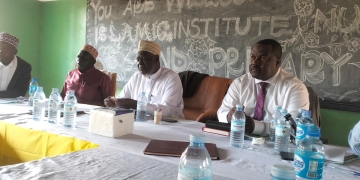The Mengo Establishment took political control of Buganda from 1892 to 1966. The pro-colonial Katikiro Kagwa allied with Capt. Lugard whose maxim gun helped to bring an end to 12 years of religious wars. Lugard depicted the Anglican faith as a crusade for heaven but in reality seeking earthy political and economic benefits.

Katikiro Kagwa became head of the Mengo Establishment and took control of events in Buganda. Mwanga knew that the end of his Kingdom was near and on 5th July 1897 fled Mengo at the head of a rebellion which in alliance with Omukama Kabalega ended in a bloody battle in Lango where the two kings were defeated by a combined force under the command of Col. Ternan and Katikiro Kagwa.
The defeat paved the way for Sir Harry Johnson to arrive in Kampala on 20th December 1899 and to the signing of the 1900 Buganda Agreement which was the indirect rule instrument through which the British perfected their divide and rule colonial policy over Uganda.
The Agreement declared Buganda as the first Province of Uganda. However the practice was that the Mengo Establishment took Buganda as a sub-state within Uganda, under the leadership of Apollo Kagwa the Katikiro and regent of the one year old Kabaka Chwa, and therefore the defacto Kabaka.
The Agreement allotted half of Buganda to the crown and the other half as private mailo and official mailo. The official mailo was attached to the offices of the various Chiefs. The private mailo was parcelled out in sQ. miles to the Kabaka, his family, Ministers, country chiefs and one thousand minor chiefs. The peasants (bibanja holders) were left landless.
The economic power of the Mengo Establishment through mailo land tenure, was reinforced, and sustained, by their political control of the Buganda sub-state. Even when Apollo Kagwa, the first leader of Mengo Establishment was forced to resign, the mailo landlord chiefs continued to derive benefits from both privately owned mailo and official mailo estates tied to their offices. The top chiefs (Ministers and Ssaza) sat in the Lukiiko had a right to vote, and approved bills and appointments of lower chiefs at Gombolola and miruka levels. They were all mailo landlords and this structure gave Mengo Establishment total control over the Buganda Sub-state.
The mailo landlords-dominated Lukiiko would not approve any legislation that undermined the mailo economic privileges. Any individual who threatened their privileges would be hounded, since the Lukiiko had political and judicial powers. The Mulamuzi (or chief Judge) was a cabinet Minister and also a voting member.
The difficulty of Buganda integrating into a united Uganda has been caused by the resistance of the Mengo Establishment to any move that would take away their privileges which constitute the vague package of the undefined “Ebyaffe” demands by residuals of the Mengo Establishment. These demands have continued to be a stumbling block in uniting Ugandans. To claim “Ebyaffe” in the twenty first century, it is imperative for one to realize that for the Uganda state to give away “Ebyaffe”, that would mean the dismembering of a nation.
The Mengo Establishment must appreciate the power of the Uganda state over them, and abandon the belief that by focusing only on the control of Buganda, they would enjoy these privileges irrespective of what Uganda thinks.
It Is a fallacy for the Mengo Establishment to believe that the 1900 Agreement was signed between two equal states, the United Kingdom and Buganda, and that it excluded the colonial Uganda state. This falsity led the Mengo Establishment to hold the view that the 1900 agreement could be terminated by Buganda without involving the whole of Uganda. They also believed that the privilege enjoyed by the Mengo Establishment through the favourable mailo tenure system could not be extended to the rest of Uganda. The creation of the KY/UPC alliance was one of the tactics by the Mengo Establishment to retain power in Buganda and block other Ugandans from participating in Buganda’s economic and political processes.
Edward Mutesa the head of the Mengo Establishment in his book “the Discretion of my Kingdom” stated that “No man except the Governor takes precedence over the Kabaka in Buganda, so Sir Walter Coutts, myself and Obote generally appeared in that order”. It was a false drive on the back of a hydra and the 1966 crisis became inevitable, bringing on stage a successful revolution that brought an end to the seventy year control of the Mengo Establishment over the affairs of Uganda through Buganda.
It takes a crisis of the sort that the Mengo Establishment faced in 1966 to analyse events and for people to change the trend of their thoughts. All social and political developments of nations proceed in fits and starts. It is a realization that, in the world we live in today, the inflexible positions that the rudimentary Mengo Establishment has been airing have not advanced the Mengo cultural institutions’ interests. A rethinking of where they want their cultural institution to go, is clearly needed.
Dr. Sam Mayanja
Minister of State for Lands
smayanja@kaa.co.ug










